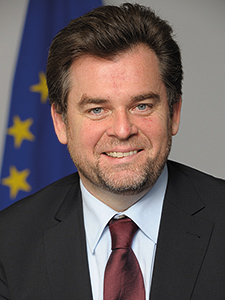Population growth together with rising incomes are speeding up consumption and demand for food, feed, fuel and other materials globally. The United Nations predicts that food production must be doubled to meet the demand from the world’s growing population, which is projected to reach 9.7 billion by 2050.

John Bell
“Within the coming decades we will be facing enormous and unprecedented challenges that will result in environmental, social, political and economic changes across the world,” predicts John Bell, Director of the Bioeconomy Directorate in the European Commission’s Directorate-General for Research and Innovation.
Land availability and soil conservation together with the effects of climate change will limit agricultural production. Meanwhile, other biomass resources like marine and forestry biomass, but in particular waste, are still underexploited.
We need more research and technology development to harness this biomass potential in a sustainable manner. Innovation is what will turn today’s bio-waste into tomorrow’s products. This will make the bioeconomy the green engine of a wider circular economy where all stocks have value at every stage of their life cycle."
The next industrial revolution
Europe is on a mission to lead the bio-economic revolution. Bioeconomy already accounts for nearly 18 million jobs in various well-established bio-based industries in Europe..
Accelerating development will offerfurther opportunities for innovation, jobs and growth, helping Europe to ‘reindustrialise’. This task requires expanding political awareness of the need for a coherent framework to promote investment in the bioeconomy globally.
An increasing number of EU Member States are creating their own bioeconomy strategies. “More than ever we need new sources of growth in Europe. We can benefit economically and environmentally from making better use of our biological resources.”
Bio-breakthroughs big and small
Europe holds the biggest share in the total number of industrial biotechnology patent applications filed since 2000. Europe has not however succeeded in commercialising its technologies as well as international competitors such as the US, Brazil, China and South East Asia.
Bell concedes that the EU market remains fragmented and is not innovation-friendly enough. A large number of Europe’s best researchers and innovators are moving to other continents in search of more favourable conditions.
One of the disadvantages faced by Europe is that land and energy costs are lower and political support and incentives are higher in its peer countries. Europe is spending 0.8% of GDP less than the US and 1.5% less than Japan every year on Research & Development (R&D).
“To unlock our potential we need to increase research and encourage more innovations in new technologies”, emphasises Bell.
“We are putting much effort into further developing bio-based products like bio-plastics, bio-chemistry as well as bio-based materials, which are very promising fields. We are also supporting new demonstration and flagship biorefineries and enabling bio-based products to reach the marketplace,” says Bell.
Where’s the money going?
In 2012, the European Commission launched its bioeconomy strategy to promote innovation and sustainable growth in Europe.
One example is the EU’s new Horizon 2020 framework programme for research and innovation, which pledges close to EUR 4 billion in support to bioeconomic research and innovation for the 2014–2020 period.
On the R&D side, the EU has created the Bio-based Industries Joint Undertaking, which is a new EUR 3.7 billion Public-Private Partnership between the EU and the Bio-based Industries Consortium.
“This initiative is financing major demonstration and flagship projects in Europe to create new bio-based products from biomass coming from various waste streams. This will lead to more environmentally friendly growth by reducing Europe’s dependency on fossil-based products. It also helps the EU to meet climate change targets.”
Investing in Europe’s future
Bell sees a need to improve the regulatory environment and access to capital in order to encourage more investment in Europe. The European Fund for Strategic Investments (EFSI) has been launched jointly by the EIB Group and the European Commission to help overcome the current investment gap in the EU by mobilising private financing for strategic investments.
“The projects funded by the EFSI will cover a much broader range than those from Horizon 2020, and will have an immediate impact on job creation and growth. The first round of EFSI investments included large bioeconomy projects.”
Another initiative launched by the European Investment Bank Group in cooperation with the European Commission under Horizon 2020 is InnovFin. It consists of a series of integrated and complementary financing tools and advisory services designed to support investments from the smallest to the largest enterprises.
“Building the bioeconomy is a joint endeavour, involving public authorities at all levels, and most importantly entrepreneurs, primary producers, scientists and civil society at large. If we can maintain our technological leadership, Europe will continue to produce innovative, sustainable and high-added value products that can reach global markets,” concludes Bell.
“The bio-based economy is going to play a key role in replacing fossil fuels on a large scale, but this is not just about energy. We are also seeing new emerging sectors, such as biomaterials and green chemistry.”
Vesa Puoskari
